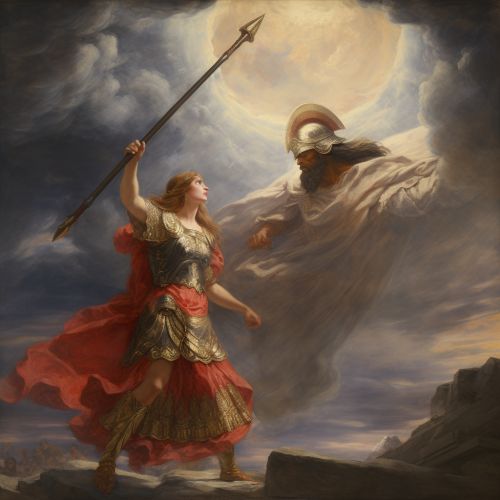Athena
Origins and Birth
Athena, also referred to as Athene, is a goddess in ancient Greek religion and mythology. She is often associated with wisdom, courage, inspiration, civilization, law and justice, strategic warfare, mathematics, strength, strategy, the arts, crafts, and skill. Athena is also a shrewd companion of heroes and the goddess of heroic endeavour. She is the virgin patroness of Athens, which built the Parthenon on the Acropolis of the same name in her honor.
According to the most popular version of her birth story, she sprung fully grown and armored from the forehead of her father, Zeus, after he swallowed her mother, Metis. The story symbolizes the power of intellect, as Athena is born directly from Zeus's forehead, representing the mind.


Attributes and Symbols
Athena's most common symbol was the owl, and in Greek mythology, the bird is traditionally associated with the goddess. The owl, in particular, symbolizes wisdom and vigilance because it can see in the dark and is vigilant. Athena's other symbols include the olive tree and the snake. The olive tree represents peace and prosperity, while the snake symbolizes renewal and transformation.
Athena in Mythology
Athena plays a significant role in various myths. She is one of the twelve Olympians, the principal gods in the Greek pantheon, and she presides over war, wisdom, and crafts. Athena is known for her calm temperament and is primarily a goddess of wisdom and peace. However, she could also be a war goddess if necessary, especially when it came to defending her city, Athens.
In the Trojan War, Athena often assisted the Achaeans (Greeks). She was a staunch ally of Achilles, Odysseus, and Diomedes. She also played a crucial role in the eventual destruction of Troy, notably in the creation of the Trojan Horse.
Athena also figures prominently in the quests of Perseus and Heracles (Hercules), where she provides assistance and guidance. Her wisdom, bravery, and resourcefulness are evident in these myths, further solidifying her status as a vital deity in Greek mythology.
Cult of Athena
Athena was widely worshipped throughout Greece, but her most important cult was in Athens, where she was the city's patron deity. The Athenian Acropolis, a hill in the center of the city, was dedicated to her. The most significant building on the Acropolis is the Parthenon, a temple built in her honor. Inside the Parthenon was a statue of Athena Parthenos, made by the sculptor Phidias and considered one of the wonders of the ancient world.
The Athenians celebrated Athena during the Panathenaic Festival, which was held in her honor. This festival was the most significant event in the city's calendar and included athletic contests, a procession, and a great feast.
Athena in Art
Athena was a popular subject for ancient Greek artists. She is often depicted with her symbols, the owl and the olive tree, and typically wears a helmet and carries a shield. One of the most famous depictions of Athena is the statue Athena Parthenos, which once stood in the Parthenon.
In addition to sculpture, Athena was a common subject in vase painting and coin design. Her image was used on the coinage of many different city-states, including Athens, where she was the patron deity.
Legacy
Athena's legacy extends beyond the ancient world. She continues to be a symbol of wisdom, courage, and female empowerment. Athena's influence can be seen in various aspects of modern culture, including literature, art, and architecture. Her name has been used for countless entities, from military ships to software companies, reflecting her association with wisdom, strategy, and warfare.
